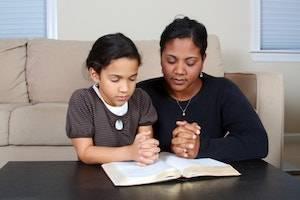Differences of Religion and Child Custody
 Raising a child requires both parents to compromise on key issues that form the basis of the child's core values. Even parents who have similar child-rearing philosophies are bound to have areas of disagreement. Education, medical care, extracurricular activities and friends are all areas in which parents are apt to conflict. However, one matter that has the potential to provoke the strongest reaction is religion. Navigating this issue as part of divorce and child custody decisions can be difficult, especially if each parent subscribes to a different religious practice.
Raising a child requires both parents to compromise on key issues that form the basis of the child's core values. Even parents who have similar child-rearing philosophies are bound to have areas of disagreement. Education, medical care, extracurricular activities and friends are all areas in which parents are apt to conflict. However, one matter that has the potential to provoke the strongest reaction is religion. Navigating this issue as part of divorce and child custody decisions can be difficult, especially if each parent subscribes to a different religious practice.
As more people now appear to be entering into inter-faith marriages, legal resolution of disagreements over a child's religious upbringing may become more common if these marriages end in divorce. The recently announced divorce of Janet Jackson from her husband of four years is one example of a divorcing couple in this situation.
Jackson was raised as a Jehovah's Witness, while her husband is a practicing Muslim. These two belief systems could lead to a protracted fight in Court if the parties strongly defend their positions. Illinois specifically requires the issue of religion be addressed in a parenting plan or in the Court's allocation of parental responsibilities, if the parties cannot reach an agreement.
Religious Upbringing and Other Core Issues Parent Must Divide
All child custody determinations have two major aspects: parenting time and decision-making responsibilities. Parenting time refers to how often a parent will have physical custody of the child. Decision-making responsibilities relate to significant matters for parents to decide that will affect the child's life in the long-term. The basic issues that fall under the umbrella of decision-making responsibilities are:
- Education;
- Physical/mental health;
- Religion; and
- Extracurricular activities.
The law goes on to define what is contained within the scope of the religious upbringing of a child as a reflection of how divisive this subject can be, and includes:
- Choice of religion or the specific denomination;
- Enrollment at a religious school;
- Religious training; or
- Observance of religious customs and practices.
How Courts Evaluate the Allocation of Religious Upbringing
Ideally, the parents form an agreement on the division of childcare and decision-making responsibilities privately. Courts must accept the terms of the parents' agreement, absent a finding that the agreement is unconscionable, which is very unlikely. If no agreement is possible, the Court will allocate these responsibilities according to the child's best interests and the Judge may award all the authority over decision-making to one parent.
When a Court evaluates how to allocate decisions on religion, particular considerations must be applied that both constrain and direct the Court's final determination. Considerations include the following:
- The Court should first look to express or implied agreements on religion between the parents, and adopt them, if they exist;
- In the absence of an agreement, the past conduct of each parent on the child's religious upbringing should be the next source of guidance for the Court; and
- Finally, in the event the parents did not have an agreement on this issue or had any practices or customs affiliating them with religious practice, the Court is not permitted to allocate decision-making on this matter. If one or both parents later decide to introduce religion to the child, mutual agreement or Court intervention may be necessary.
Consult an Illinois Family Law Attorney
If you are contemplating divorce and have child custody concerns, talking to an experienced Rolling Meadows family law attorney about your legal rights is an important step to making informed decisions. The Law Office of Nicholas W. Richardson, P.C. understands the stress surrounding this issue, and will approach your case with an eye to alleviating this burden. If you need assistance, contact Attorney Richardson to schedule a free consultation.
Resources:
http://www.pewresearch.org/fact-tank/2015/06/02/interfaith-marriage/
http://people.com/music/janet-jackson-wissam-al-mana-interfaith-divorce-custody/
Introducing The Law Office of Nicholas W. Richardson
Nicholas W. Richardson is an experienced divorce lawyer and mediator whose comprehensive legal knowledge, commitment to clients and reputation for results bring lasting solutions to your problems.






